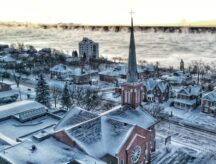The most (and least) expensive cities for renters in Canada
The November 2023 Rentals.ca Rent Report was recently released, examining the average rent for 1 bedrooms and 2 bedrooms in 35 cities across Canada.
Discover if You Are Eligible for Canadian Immigration
The report explains that rent in Canada has increased by $175 in the past six months, and for the sixth month in a row, rents hit a new high, averaging $2,178 in October across the country.
The annual rate of rent growth in Canada was 9.9% in October, which represents the second fastest annual increase of the past seven.
The report explains that rent inflation in Canada is being driven by increases in price for rentals in Alberta, Quebec and Nova Scotia, due to strong population growth and new rental supply priced at higher-than-average market rents.
What are the most expensive cities to rent in?
According to the rental report, the five most expensive cities to rent in are:
- Vancouver, BC: The average rent for a 1-bedroom costs $2,872 and $3,777 for a 2-bedroom.
- Burnaby, BC: The average rent for a 1-bedroom costs $2,647 and $3,341 for a 2-bedroom.
- Toronto, ON: The average rent for a 1-bedroom costs $2,607 and $3,424 for a 2-bedroom.
- Oakville, ON: The average rent for a 1-bedroom costs $2,524 and $3,337 for a 2-bedroom.
- Mississauga, ON: The average rent for a 1-bedroom costs $2,352 and $2,851 for a 2-bedroom.
Among Canada’s 25 most expensive markets to rent in, 14 were located in Ontario, while nine were in British Columbia.
Vancouver continues to top the list with the highest average rent for all categories, followed by the General Toronto Area and Peel region.
The data suggests that prices have dropped in Toronto, Canada’s biggest city, last month year-over year, however only less than one per cent. The drop marks the first annual rent decrease seen in the city since August 2021.
British Columbia has maintained the highest average asking rents for apartments by province at $2,639 in October. However, BC rents decreased slightly from month to month, the second consecutive monthly decline. This suggests rent prices in BC may continue to fall.
Ontario was actually the province with the slowest annual growth in apartment rents during the month of October, with a 4.6% increase (compared to a 6.6% increase in September).
What are the least expensive cities to rent in?
According to the rental report, the five least expensive cities to rent in are:
- Saskatoon, SK: The average rent for a 1-bedroom costs $1,109 and $1,340 for a 2-bedroom.
- Regina, SK: The average rent for a 1-bedroom costs $1,191 and $1,405 for a 2-bedroom.
- Fort McMurray, AB: The average rent for a 1-bedroom costs $1,226 and $1,478 for a 2-bedroom.
- Red Deer, AB: The average rent for a 1-bedroom costs $1,249 and $1,464 for a 2-bedroom.
- Winnipeg, MB: The average rent for a 1-bedroom costs $1,282 and $1,692 for a 2-bedroom.
The cheapest places to rent in Canada are typically found in smaller cities and rural areas.
The Prairie provinces of Manitoba and Saskatchewan had the largest month to month rent increases of 5.5% and 4%, respectively. In Manitoba, average asking rents for apartments reached $1,510, rising 7.6% annually in October, compared to 3.1% annual growth in September. Saskatchewan apartment rents rose 5.8% annually in October to an average of $1,409, accelerating from a 3.8% year-over-year rate of increase in September.
How to find a place to rent in Canada
Figuring out the right place to rent can be hard. It is important to spend time thinking about the kind of place you want, where you want to live and your budget.
Canada offers a variety of rental and permanent housing options for newcomers, including apartments, single-family detached homes, duplexes or triplexes, townhouses, and individual rooms:
- Apartments, typically found in buildings or houses, are single-family units that usually have one, two, or three bedrooms.
- Single-family detached homes are standalone properties on their own lot, while duplexes or triplexes are houses divided into two or three units.
- Townhouses are constructed with three or more units that share adjoining walls and can be stacked, resulting in separated top and bottom floors; and
- Homes can be divided into separate bedrooms, which are rented to individuals who share common spaces such as kitchens and bathrooms.
It is always advisable to look at specific neighbourhoods in the area you are planning to move, and doing searches on free services like Google Maps, to get an idea of not just the general area, but also at your specific neighbourhood.
Once you have figured what kind of place you want to live in and where, there are many resources you can use to find a place to rent.
One of the easiest ways to search for housing is to walk around the neighbourhood you are interested in and look for "For Rent" signs. You can then ask the superintendent if there are any units available now or soon. Other places to look for apartments or housing to rent include:
- Rental agencies
- Realtor.ca: A website that allows you to search for rental properties across Canada. You can use filters to narrow down the search by location, price, property type, etc.;
- Online rental listings platform: such as Zumper and PadMapper offer a convenient way to search for rental properties in Canada, allowing users to filter by location, price, number of bedrooms, and view apartment locations on a map;
- Bulletin boards in grocery stores, laundromats, health clinics, community centres, service clubs, or real estate offices; and
- Your local immigrant settlement agency: Many agencies offer services related to housing, such as help with finding a place to live and understanding your rights and responsibilities as a tenant
- Do you need Canadian immigration assistance? Contact the Contact Cohen Immigration Law firm by completing our form
- Send us your feedback or your non-legal assistance questions by emailing us at media@canadavisa.com







